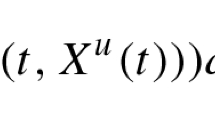Abstract
A controllability problem for a Fokker-Planck equation is termedProblem A. Under proper assumptions, a solution (v*, Ф*) to that problem is constructed by a Theorem of Jamison. Theorem 2 gives a sufficiency condition concerning the given initial and terminal data for that solution to exist. Theorem 3 states that v* is an optimal feedback control for a stochastic optimal control problem with constraint on the end-state, termedProblem B. Further, v* corresponds to the minimum of an entropy distance. Finally, Problem A is transformed into a controllability problem for a stochastic differential equation, termedProblem C: the solution to Problem C corresponding to the one constructed in Problem A is the Markovian process satisfying the given end conditions in a set of reciprocal processes of Jamison.
Similar content being viewed by others
References
S. Bernstein, “Sur les liaisons entre les grandeurs aléatoires,” in Verh. des intern. Mathematikerkongt, Zürich, Band, 1, 1932.
A. Beurling, “An Automorphism of Product Measures,”Annals of Mathematics, vol. 72, no. 1, pp. 189–200, July 1960.
A. Blaquière, “Liens entre la Theorie Géométrique des Processus Optimaux et la Mécanique Ondulatoire,”Comptes Rendus de l'Académie des Sciences, Série A, vol. 262, pp. 593–595, 1966.
A. Blaquière, “Wave mechanics as a two-player game,”International Seminar on Mathematical Theory of Dynamical Systems and Microphysics International Center for Mechanical Sciences (CISM), Udine, Italy, 1979, CISM Courses and Lectures no. 261, Springer-Verlag, Wien, New York 1980.
A. Blaquière, “System Theory: A New Approach to Wave Mechanics;”Journal of Optimization Theory and Applications, vol. 32, pp. 463–478, 1980.
A. Blaquière et A. Marzollo, “Introduction à la théorie moderne de l'optimisation et ä certains de ses aspects fondamentaux en physique,” Colloque de la Fondation Louis de Broglie: la Pensée Physique Contemporaine, Science et Humanisme en notre Temps, Peyresq, 1980, Editions Augustin Fresnel, Moulidars, 1982.
A. Blaquière, “Girsanov Transformation and two Stochastic Optimal Control Problems. The Schrödinger System and Related Controllability Results,” inModeling and Control of Systems in Engineering, Quantum Mechanics, Economics and Biosciences, Lecture Notes in Control and Information Sciences 121, Springer-Verlag, Berlin, Heidelberg, 1989;Proceedings of the third Bellman Continuum Int. Workshop, 1988.
A. Blaquière, “Controllability of a Fokker-Planck Equation, the Schrödinger System, and a Related Stochastic Optimal Control,” inMechanics and Control, J.M. Skowronski, H. Flashner, and R.S. Guttalu (eds.), Lecture Notes in Control and Information Sciences 470, Springer-Verlag, New York, pp. 35–56, 1992.
A. Blaquière, “Sufficiency Conditions for Existence of an Optimal Feedback Control in Stochastic Mechanics,”Dynamics and Control, vol. 1, pp. 7–24, 1991.
L. de Broglie,Une tentative d'interprétation causale et nonlinéaire de la mécanique ondulatoire, Gauthier-Villars: Paris, 1956.
P. Dai Pra and M. Pavon, “On the Markov processes of Schrödinger, the Feynman-Kac formula and stochastic control,” inRealization and Modeling in System Theory, Proc. 1989 MTNS Conf., M.A. Kaashoek, J.H. van Schuppen, A.C.M. Ran Eds., Birkäuser, Boston, pp. 497–504, 1990.
P. Dai Pra, “A Stochastic Control Approach to Reciprocal Diffusion Processes,”Appl. Math. Optim., vol. 23, pp. 313–329, 1991.
D. Dawson, L. Gorostiza, and A. Wakolbinger, “Schrödinger processes and large deviations,”J. Math. Phys., vol. 31 (10), October 1990.
E.B. Dynkin,Théorie des processes markoviens, Dunod, Paris, 1963.
W.H. Fleming, “Exit probabilities and optimal stochastic control,”Appl. Math. Optim, vol. 4, 329–346, 1978.
W.H. Fleming, “Logarithmic transformations and stochastic control, inAdvances in Filtering and Optimal Stochastic Control, W.H. Fleming and L.G. Gorostiza Eds., Lecture Notes in Control and Information Sciences, vol. 42, Springer-Verlag, Berlin, pp. 131–141, 1982.
W.H. Fleming, “Stochastic calculus of variations and mechanics,”J. Optimiz. Th. Appl. vol 41, pp. 55–74, 1983.
W.H. Fleming and R. Rishel,Deterministic and Stochastic Optimal Control, Springer-Verlag, Berlin, 1975.
W.H. Fleming and Sheunn-Jyi Shen, “Stochastic Variational Formula for Fundamental Solutions of Parabolic PDE,”Appl. Math. Optim., vol. 13, pp. 193–204, 1985.
H. Föllmer, “Random fields and diffusion processes,” in Ecole d'été de Saint Flour XV-XVII (1985–1987), Lecture Notes in Mathematics 1362, Springer-Verlag, Berlin, 1988.
A.M. Il'in, A.S. Kalashnikov, and O.A. Oleinik, “Linear Equations of the Second Order of Parabolic Type,” inRussian Mathematical Surveys, edited by K.A. Hirsch, Vol. XVII, Macmillan and Co. Ltd: London, 1962.
B. Jamison, “Reciprocal Processes,”Z. Wahrscheinlichkeitstheorie ver. Gebiete, vol. 30, 65, 1974.
K. Kime and A. Blaquière, “From two Stochastic Optimal Control Problems to the Schrödinger Equation,” inModeling and Control of Systems in Engineering, Quantum Mechanics, Economics and Biosciences, Lecture Notes in Control and Information Sciences 121, Springer-Verlag, Berlin, 1989;Proceedings of the third Bellman Continuum Int. Workshop, 1988.
R.S. Liptser and A.N. Shiryayev,Statistics of Random Processes I, General Theory, Springer-Verlag, Berlin, Heidelberg, 1977.
M. Nagasawa, “Transformations of Diffusion and Schrödinger Processes,”Probab. Th. Rel. Fields, vol. 82, pp. 109–136, 1989.
M. Nagasawa, “Stochastic variational principle of Schrödinger processes,” inSeminar on Stochastic Processes, 1989, Birkhüser, Basel, 1990.
M. Nagasawa, “Can the Schrödinger equation be a Boltzmann equation?” inDiffusion processes and related problems in Analysis, ed. by M. Pinsky, Birkhäuser, 1990.
J. Neveu,Bases Mathématiques du Calcul des Probabilités, Masson, Paris, 1970.
M. Pavon and A. Wakolbinger, “On Free Energy, Stochastic Control, and Schrödinger Processes,”Proceedings Workshop on Modeling and Control of Uncertain Systems, Birkhäuser, Boston, May 1991.
E. Schrödinger, Sitzungsbericht der Preußischen Akademie,Phys. Math. Classe, 144 (1931); “Une analogie entre la mécanique ondulatoire et quelques problèmes de probabilités en physique classique,”Annales de l'Institut Henri Poincaré, vol. 11, p. 300, 1932.
D.W. Stroock and S.R.S. Varadhan,Multidimensional Diffusion Processes, Springer-Verlag, Berlin, 1979.
A. Wakolbinger, “A Simplified Variational Characterisation of Schrödinger Processes,”J. Math. Phys., vol. 30, p. 2943, 1989.
A. Wakolbinger, Schrödinger Bridges from 1931 to 1991,to appear in Proc. of IV CLAPEM, Mexico City.
K. Yasue, “Stochastic calculus of variations,”J. Funct. Anal., vol. 41, pp. 327–340, 1981.
Author information
Authors and Affiliations
Rights and permissions
About this article
Cite this article
Blaquiére, A. Controllability of a Fokker-Planck equation, the Schrödinger system, and a related stochastic optimal control (revised version). Dynamics and Control 2, 235–253 (1992). https://doi.org/10.1007/BF02169515
Received:
Accepted:
Issue Date:
DOI: https://doi.org/10.1007/BF02169515



